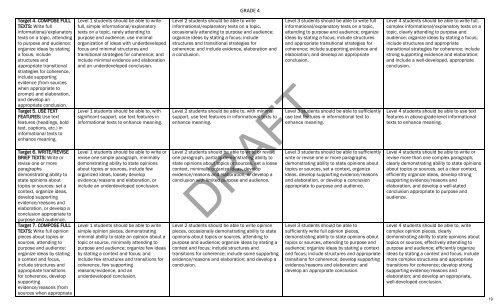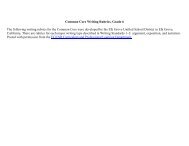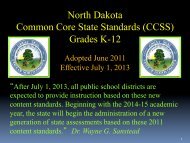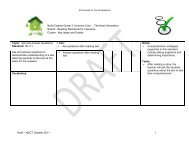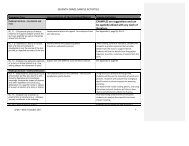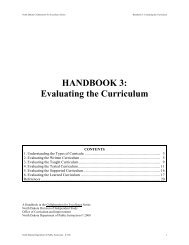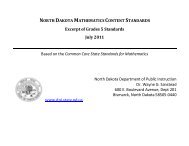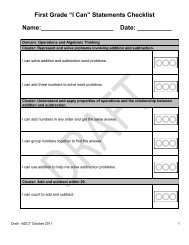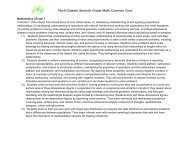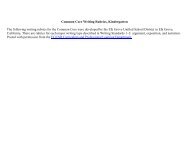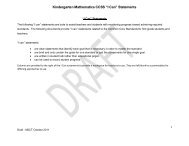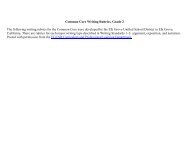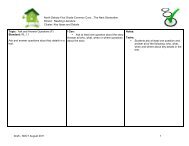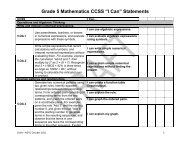SBAC Achievement Level Descriptors, Grade 4 - ND Curriculum ...
SBAC Achievement Level Descriptors, Grade 4 - ND Curriculum ...
SBAC Achievement Level Descriptors, Grade 4 - ND Curriculum ...
Create successful ePaper yourself
Turn your PDF publications into a flip-book with our unique Google optimized e-Paper software.
GRADE 4Target 4. COMPOSE FULLTEXTS: Write fullinformational/explanatorytexts on a topic, attendingto purpose and audience:organize ideas by statinga focus, includestructures andappropriate transitionalstrategies for coherence,include supportingevidence (from sourceswhen appropriate toprompt) and elaboration,and develop anappropriate conclusion.Target 5. USE TEXTFEATURES: Use textfeatures (headings, boldtext, captions, etc.) ininformational texts toenhance meaning.Target 6. WRITE/REVISEBRIEF TEXTS: Write orrevise one or moreparagraphsdemonstrating ability tostate opinions abouttopics or sources: set acontext, organize ideas,develop supportingevidence/reasons andelaboration, or develop aconclusion appropriate topurpose and audience.Target 7. COMPOSE FULLTEXTS: Write full opinionpieces about topics orsources, attending topurpose and audience:organize ideas by statinga context and focus,include structures andappropriate transitionsfor coherence, developsupportingevidence/reasons (fromsources when appropriate<strong>Level</strong> 1 students should be able to writefull, simple informational/explanatorytexts on a topic, rarely attending topurpose and audience; use minimalorganization of ideas with underdevelopedfocus and minimal structures andtransitional strategies for coherence; andinclude minimal evidence and elaborationand an underdeveloped conclusion.<strong>Level</strong> 1 students should be able to, withsignificant support, use text features ininformational texts to enhance meaning.<strong>Level</strong> 1 students should be able to write orrevise one simple paragraph, minimallydemonstrating ability to state opinionsabout topics or sources, include feworganized ideas, loosely developevidence/reasons and elaboration, orinclude an underdeveloped conclusion.<strong>Level</strong> 1 students should be able to writesimple opinion pieces, demonstratingminimal ability to state an opinion about atopic or source, minimally attending topurpose and audience; organize few ideasby stating a context and focus; andinclude few structures and transitions forcoherence, few supportingreasons/evidence, and anunderdeveloped conclusion.<strong>Level</strong> 2 students should be able to writeinformational/explanatory texts on a topic,occasionally attending to purpose and audience;organize ideas by stating a focus; includestructures and transitional strategies forcoherence; and include evidence, elaboration anda conclusion.<strong>Level</strong> 2 students should be able to, with minimalsupport, use text features in informational texts toenhance meaning.<strong>Level</strong> 2 students should be able to write or reviseone paragraph, partially demonstrating ability tostate opinions about topics or sources, set a loosecontext, minimally organize ideas, developevidence/reasons and elaboration, or develop aconclusion with limited purpose and audience.DRAFT<strong>Level</strong> 2 students should be able to write opinionpieces, occasionally demonstrating ability to stateopinions about topics or sources, attending topurpose and audience; organize ideas by stating acontext and focus; include structures andtransitions for coherence; include some supportingevidence/reasons and elaboration; and develop aconclusion.<strong>Level</strong> 3 students should be able to write fullinformational/explanatory texts on a topic,attending to purpose and audience; organizeideas by stating a focus; include structuresand appropriate transitional strategies forcoherence; include supporting evidence andelaboration; and develop an appropriateconclusion.<strong>Level</strong> 3 students should be able to sufficientlyuse text features in informational text toenhance meaning.<strong>Level</strong> 3 students should be able to sufficientlywrite or revise one or more paragraphs,demonstrating ability to state opinions abouttopics or sources, set a context, organizeideas, develop supporting evidence/reasonsand elaboration, or develop a conclusionappropriate to purpose and audience.<strong>Level</strong> 3 students should be able tosufficiently write full opinion pieces,demonstrating ability to state opinions abouttopics or sources, attending to purpose andaudience; organize ideas by stating a contextand focus; include structures and appropriatetransitions for coherence; develop supportingevidence/reasons and elaboration; anddevelop an appropriate conclusion.<strong>Level</strong> 4 students should be able to write full,complex informational/explanatory texts on atopic, clearly attending to purpose andaudience; organize ideas by stating a focus;include structures and appropriatetransitional strategies for coherence; includestrong supporting evidence and elaboration;and include a well-developed, appropriateconclusion.<strong>Level</strong> 4 students should be able to use textfeatures in above-grade-level informationaltexts to enhance meaning.<strong>Level</strong> 4 students should be able to write orrevise more than one complex paragraph,clearly demonstrating ability to state opinionsabout topics or sources, set a clear context,efficiently organize ideas, develop strongsupporting evidence/reasons andelaboration, and develop a well-statedconclusion appropriate to purpose andaudience.<strong>Level</strong> 4 students should be able to, writecomplex opinion pieces, clearlydemonstrating ability to state opinions abouttopics or sources, effectively attending topurpose and audience; efficiently organizeideas by stating a context and focus; includemore complex structures and appropriatetransitions for coherence; develop strongsupporting evidence/reasons andelaboration; and develop an appropriate,well-developed conclusion.19


